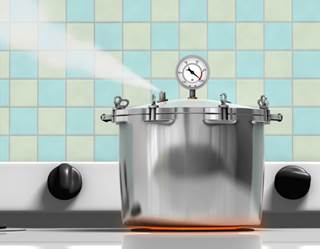|
|
Study Probes Boiling Methods for Cutting Phosphorus in Meat - Renal and ... - Renal and Urology News |
July 22, 2015

Boiling sliced meat in a pressure cooker filled with soft water may be a promising way for dialysis patients to reduce phosphorus intake.
Boiling sliced meat in a pressure cooker containing soft water and then discarding the cooking liquid may provide a good way for dialysis patients to reduce phosphorus levels while maintaining adequate protein intake, a new study suggests.
Masae Sakuma, PhD, and colleagues from the University of Shizuoka in Japan, assessed the phosphorus and protein content of beef cooked in a variety of ways. They cut beef in 100 gram blocks, cubes, or slices (i.e., muscle fibers cut vertically). They used different cooking liquids, including soft bottled water, hard water, 5% acetate solution (i.e., a mixture of soft water and vinegar), and 0.5% sodium bicarbonate water (i.e., a mixture of soft water and sodium bicarbonate). They cooked the beef either in a regular pan or pressure cooker for 10 or 30 minutes.
According to results published online ahead of print by the Journal of Renal Nutrition, certain methods decreased the phosphorus content of the meat the most. Soft water was the best cooking liquid, probably due to preferential osmotic pressure. Sliced meat appeared to provide a large surface area for phosphorus to exit. Likewise, pressure cookers, which allow cooking at a higher temperature and pressure, allowed the muscle fibers in meat to flex easily so phosphorus flowed readily. Since phosphorus leaches into the cooking liquid, the liquid must be discarded. Based on previous research, the investigators further suggested that boiling meat is more effective at reducing phosphorus than pre-soaking it.
Importantly, the protein content of the meat stayed the same. “The dissociation between phosphorus and protein is possible because boiling may easily influence the discharge of phosphorus from the intercellular and extracellular spaces and from the phospholipids of cell membranes, whereas proteins remain within the cells and are not lost in the boiling fluids,” the investigators explained.
The cooking advice is particularly valuable for dialysis patients who need to avoid protein-energy malnutrition. Rather than consume only low phosphorus foods, which tend to be low in protein, they can cook meat to lower phosphorus while retaining protein. The National Kidney Foundation Kidney Disease Outcomes Quantity Initiative guidelines recommend a daily phosphorus intake of 10 to 12 mg per gram of protein.
Source
- Ando, S; Sakuma, M; Morimoto, Y; and Arai, H. Published online by Journal of Renal Nutrition, July 2015; doi: 10.1053/j.jrn.2015.05.005.
|
|
|
BMI Doesn't Affect Kidney Transplant Survival - Renal and Urology News |
July 22, 2015

No difference between defined BMI bands in patient or graft survival for transplanted patients.
(HealthDay News) -- For patients undergoing kidney transplantation, survival is unaffected by body mass index (BMI), according to a study published online in the American Journal of Transplantation.
Nithya Krishnan, M.B.B.S., from the University Hospitals Coventry and Warwickshire NHS Trust in the United Kingdom, and colleagues examined the impact of BMI on mortality in transplanted patients and those remaining on the waiting list in the United Kingdom. Data were analyzed from the U.K. Renal Registry and the National Health Service Blood and Transplant Organ Donation and Transplantation. From Jan. 1, 2004, to Dec. 31, 2010, 17,681 patients were listed, and BMI was recorded for 77%. Patients were followed through Dec. 31, 2011.
The researchers found that in all BMI bands, 1- and 5-year patient survival was significantly better in the transplant group versus the waiting list group. The results were essentially the same in analyses excluding live donor transplants. There was no cutoff observed among patients with higher BMI where there would be no benefit of transplantation in analyses of survival with BMI as a continuous variable. There was no difference in patient or graft survival between the defined BMI bands for the 8,088 transplanted patients.
"As BMI in the population is rising and likely to continue to rise, it is important that Renal Units respond to this challenge with positive attitude toward widening access to transplant," the authors write.
Sources
- Krishnan, N; Higgins, R; Short, A; et al. American Journal of Transplantation; doi: 10.1111/ajt.13363.
- Kalantar-Zadeh, K; von Visger, J; Foster, E; et al. American Journal of Transplantation; doi: 10.1111/ajt.13367.
|
|
BMI Doesn't Affect Kidney Transplant Survival - Renal and Urology News - Renal and Urology News |
July 22, 2015

No difference between defined BMI bands in patient or graft survival for transplanted patients.
(HealthDay News) -- For patients undergoing kidney transplantation, survival is unaffected by body mass index (BMI), according to a study published online in the American Journal of Transplantation.
Nithya Krishnan, M.B.B.S., from the University Hospitals Coventry and Warwickshire NHS Trust in the United Kingdom, and colleagues examined the impact of BMI on mortality in transplanted patients and those remaining on the waiting list in the United Kingdom. Data were analyzed from the U.K. Renal Registry and the National Health Service Blood and Transplant Organ Donation and Transplantation. From Jan. 1, 2004, to Dec. 31, 2010, 17,681 patients were listed, and BMI was recorded for 77%. Patients were followed through Dec. 31, 2011.
The researchers found that in all BMI bands, 1- and 5-year patient survival was significantly better in the transplant group versus the waiting list group. The results were essentially the same in analyses excluding live donor transplants. There was no cutoff observed among patients with higher BMI where there would be no benefit of transplantation in analyses of survival with BMI as a continuous variable. There was no difference in patient or graft survival between the defined BMI bands for the 8,088 transplanted patients.
"As BMI in the population is rising and likely to continue to rise, it is important that Renal Units respond to this challenge with positive attitude toward widening access to transplant," the authors write.
Sources
- Krishnan, N; Higgins, R; Short, A; et al. American Journal of Transplantation; doi: 10.1111/ajt.13363.
- Kalantar-Zadeh, K; von Visger, J; Foster, E; et al. American Journal of Transplantation; doi: 10.1111/ajt.13367.
|
|
A day of pampering for dialysis patients - ABC Local |
|
"I'm 51 but I still look young," Carole Reid said, a dialysis patient from Warburton, West Australia.
"I feel it inside, I'm young."
In the process of getting her hair dyed brown, Ms Reid was speaking from Salon Day at the Purple House, headquarters of Western Desert Dialysis in Alice Springs.
The organisation provides dialysis services and incorporates a range of other services around social support and well being.
The Salon Day is an annual event that gives patients the opportunity to get their hair dyed and enjoy a cook-up of damper.
Click on the audio to hear Carole Reid and Jedda Marshall (from Papunya) speaking to ABC Alice Springs' Alice Moldovan.
|
|
FINCHANNEL.com - “Cell therapy using human iPSC-derived renal progenitors ... - The FINANCIAL |
|
Summary:
New method for generating renal progenitors from human induced pluripotent stem cells (hiPSCs) was established;
Transplantation of human iPSC-derived renal progenitors ameliorated acute kidney injury (AKI) in mice;
Cell therapy using the hiPSC-derived renal progenitor cells could be developed for kidney diseases;
The research group found that transplantation of human iPSC-derived renal progenitors suppressed the renal dysfunction and histopathological changes associated with AKI in mice.
AKI is defined as a rapid loss of renal function resulting from various etiologies, with a mortality rate exceeding 60% among intensive care patients. Because conventional treatments have failed to alleviate this condition, a new innovative treatment option such as regenerative therapies is strongly anticipated. In this February, Italian research group reported that transplantation of human iPSC-derived renal progenitors via the tail vein ameliorated renal injury in a cisplatin-induced AKI mouse model, according to Astellas.
Transcription factors, Osr1 and Six2 interact synergistically to maintain nephron progenitor status during kidney organogenesis, and the combination of Osr1 and Six2 can be used as a specific marker set to define nephron progenitors. The research group has established a novel protocol to efficiently differentiate hiPSCs into OSR1+SIX2+ renal progenitors, and demonstrated the progenitors were able to form proximal renal tubule-like structures in vitro and in vivo. Moreover, in ischemia/reperfusion-induced AKI mouse model, renal subcapsular transplantation of these cells significantly suppressed the elevation of blood urea nitrogen and serum creatinine levels and attenuated histopathological changes, such as tubular necrosis.
This is the first report to demonstrate that the transplantation of renal progenitor cells differentiated from human iPSCs have therapeutic efficacy in the AKI mouse model induced by ischemia/reperfusion. No engraftment of transplanted renal progenitor cell indicates that trophic factors secreted from the cells exerted reno-protective effects on the host kidney.
These findings therefore suggest that cell therapy using hiPSC-derived renal progenitors might become one of therapeutic options for AKI patients by ameliorating renal tissue damage and possibly preventing transition to chronic tissue damage. Based on the findings, Astellas and CiRA will explore the possibility to develop new cell-based therapies for not only AKI but also chronic kidney disease (CKD).
|
|
|
|
|
<< Start < Prev 41 42 43 44 45 46 47 48 49 50 Next > End >>
|
|
Page 43 of 2630 |
 Log in to explore the world's most comprehensive database of dialysis centres for free!
Log in to explore the world's most comprehensive database of dialysis centres for free!  Professional dialysis recruitment
Professional dialysis recruitment


